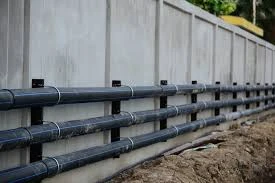Oct . 21, 2024 18:46 Back to list
HDPE Pipe Connection Solutions for Improved Durability and Efficiency in Water Systems
Understanding HDPE Pipe Couplings Importance and Applications
High-Density Polyethylene (HDPE) pipes have gained significant popularity in various industries due to their durability, flexibility, and resistance to corrosion. One of the crucial components that facilitate the efficiency of HDPE piping systems is the HDPE pipe coupling. This article will explore what HDPE pipe couplings are, their types, benefits, installation processes, and applications across different sectors.
What Are HDPE Pipe Couplings?
HDPE pipe couplings are fittings that connect two pieces of HDPE pipes together. Their primary function is to maintain the integrity of a pipeline while allowing for flexibility and adaptability. Couplings can connect pipes of the same diameter or allow for the transition between different pipe sizes, ensuring a seamless flow of liquids or gases.
Types of HDPE Pipe Couplings
There are several types of HDPE pipe couplings based on their applications
1. Electrofusion Couplings These couplings use an electrically conductive jointing system that melts the pipe and coupling together. This creates a strong, leak-proof bond. They are widely used in buried applications where a waterproof seal is crucial.
2. Butt Fusion Couplings This method involves heating the ends of the two pipes to be joined and then pushing them together, resulting in a durable fusion. Butt fusion couplings are typically used for larger diameter pipes and permanent installations.
3. Mechanical Couplings These are simpler to install and can be disassembled if necessary. Mechanical couplings use bolts or clamps to connect pipes and are often utilized in situations where maintenance or adjustments may be needed.
4. Transition Couplings These couplings allow HDPE pipes to connect with different materials like PVC, ductile iron, or steel. Transition couplings are essential where different piping materials exist in a given system.
Benefits of HDPE Pipe Couplings
The use of HDPE pipe couplings offers numerous advantages, including
- Durability HDPE materials are known for their strength, making them resistant to impact, pressure, and environmental stress.
- Corrosion Resistance Unlike metal pipes, HDPE does not corrode or rust, ensuring a longer service life without the risk of leaks.
- Flexibility HDPE pipes have the ability to bend without breaking, which is particularly beneficial in areas with ground movement or uneven terrain.
- Cost-Effectiveness While the initial investment in HDPE piping systems may be higher, the reduced maintenance and replacement costs contribute to overall savings in the long term.
hdpe pipe coupling

Installation Process
Installing HDPE pipe couplings requires careful planning and execution
. The steps involved typically include1. Preparation Before installation, ensure that all tools and materials are at hand. The pipes should be cut to the desired length, and the ends must be cleaned to ensure a smooth connection.
2. Joining Method Depending on the type of coupling chosen, select the appropriate joining method (electrofusion, butt fusion, or mechanical).
3. Heating (if applicable) For electrofusion and butt fusion methods, heat the surfaces of the pipes and the couplings until a molten layer forms.
4. Joining Press the two heated surfaces together, allowing them to cool and solidify, creating a strong bond.
5. Testing After installation, the system should be tested for leaks and pressure integrity.
Applications
HDPE pipe couplings are widely utilized across various sectors
- Water Supply and Distribution Many municipalities use HDPE pipes for drinking water distribution due to their non-toxic nature and durability.
- Waste Management They are used in sewer systems and waste pipelines, where resistance to chemicals and backflow is essential.
- Agriculture HDPE pipes are crucial in irrigation systems, helping to convey water efficiently across large fields.
- Oil and Gas Couplings are utilized for underground pipelines transporting gas or oil, where safety and reliability are paramount.
Conclusion
In conclusion, HDPE pipe couplings play a vital role in the efficiency and reliability of piping systems. Their diverse types and applications highlight their significance across various industries. As technology advances, the benefits of using HDPE and its couplings will continue to be invaluable for ensuring seamless, durable, and efficient fluid transport. Whether in municipal infrastructure, industrial applications, or agricultural setups, understanding and utilizing proper HDPE couplings can lead to greater system performance and longevity.
-
High-Quality PPR Pipes and Fittings Durable ERA PPR & PVC PPR Solutions
NewsJul.08,2025
-
Black HDPE Cutting Board - Durable, Non-Porous & Food Safe HDPE Plastic Cutting Board
NewsJul.08,2025
-
High-Quality CPVC Panel Durable HDPE & PVC Panels Supplier
NewsJul.08,2025
-
Double PE Welding Rod Supplier - High Strength, Durable & Versatile Welding Solutions
NewsJul.07,2025
-
High-Quality PVC-O Pipe Supplier Durable 75mm PVC Pipe & Connections Leading PVC Pipe Company
NewsJul.07,2025
-
HDPE Drainage Pipe Supplier – Durable & Corrosion-Resistant Solutions
NewsJul.06,2025

